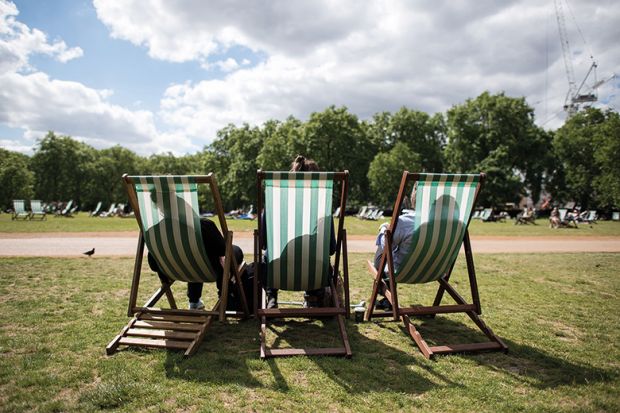Ah, summer holidays. Long days in the garden, with only the sound of insects on clover-studded lawns; children playing in chilly waters and seaweedy tidelines; the cry of French market traders touting the special virtues of their cherries in the shade of the plane trees…
If any of these sounds familiar, then good for you. Holidays are important. Far more important than an extra few days eked out of an exhausted body and brain that cannot, for one reason or another, switch off and check out.
Anyone who has ever been on holiday, or who has failed to take one for months on end, knows this is true. Research has provided ample evidence, too, that one of the keys to being productive at work is not working too hard. In an age of deteriorating mental well-being, proper breaks are a no-brainer.
But is this always an accepted truth in academia?
There are many professional fields where workloads, stress and a sense of insecurity have increased over the past five or 10 years. Academia certainly is not alone in that.
But there are aggravating features that make working life for those in higher education particularly hard to balance with the rest of life – the stuff that, when all is said and done, matters most.
In our features pages this week, we have two contrasting pieces: one a lament on the relentless grind that the author says academic life has become; the other a celebration of holidays in the form of five scholars’ personal guides to the graveyards of Paris, the highways and byways around Los Angeles, the British seaside, the cultural honeypot of Rome and the fleshpots of Magaluf.
Let’s get the problems out of the way first. In her analysis of academic working life, Ruth Barcan, an associate professor at the University of Sydney, points to the high rate of attrition among colleagues who, she says, are being driven out despite most having a very real vocation for their work.
Barcan highlights this as a crucial disconnect for many in academic roles: that a high proportion, when surveyed, say that they find their job rewarding but also want to quit.
“A recurring contradiction is that people who truly and deeply loved academic work are much happier and healthier now that they are no longer doing it,” she writes.
That academic life is a calling, and as such expects (and usually gets) an exceptionally engaged and committed workforce, hardly needs saying. Barcan identifies its “boundlessness, its enmeshment with personal identity, and its putative commitment to the social good” as being key here.
But she argues that these traits can also be to blame for the ratcheting-up of stress and barely manageable workloads, while also pointing out the years of training, precarious nature of the profession, and the difficulty of “getting back in” after stepping out.
To expect a holiday to solve such issues would be optimistic, but taking time away from it all is an essential part of maintaining perspective and balance, and if you’re looking for late inspiration this summer, we bring you the 2017 Times Higher Education academic holiday guide.
Whether, like Emma Rees, you’re a fan of Parisian catacombs, or, like John Sutherland, you prefer the California that you dreamed of as a film-obsessed child, our contributors are sure to offer something to refresh even the most frazzled scholarly mind. As Rachel Moss puts it in our opinion pages: “A summer vacation should count as a success if it leaves you feeling healthy and relaxed, ready to face the new academic year with enthusiasm rather than dread.”
So go on, have a holiday. You’ll be doing everyone a favour, colleagues and students included. And if your boss disagrees – well, he or she needs to find some perspective. Perhaps they should have a holiday, too.
Register to continue
Why register?
- Registration is free and only takes a moment
- Once registered, you can read 3 articles a month
- Sign up for our newsletter
Subscribe
Or subscribe for unlimited access to:
- Unlimited access to news, views, insights & reviews
- Digital editions
- Digital access to THE’s university and college rankings analysis
Already registered or a current subscriber? Login
